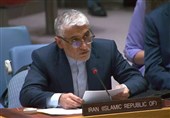US Senate Passes Sweeping Sanctions Bill against Iran, Russia
TEHRAN (Tasnim) – The US Senate overwhelmingly passed a bill on Thursday that would step up sanctions against Iran and Russia, in the process delivering a rebuke to President Trump’s policies toward Russia and Europe with a veto-proof majority.
The measure, which senators passed by a vote of 98 to 2, includes new sanctions against Moscow over its continued involvement in the wars in Ukraine and Syria and for its alleged meddling in the 2016 US presidential election.
The bill also includes new sanctions on Iran over its ballistic missile program and alleged “continued support for terrorism.”
Senators Rand Paul and Bernie Sanders were the only two "no" votes in the 100-member Senate.
In order for the bill to become law, it must still pass the US House of Representatives and be signed by Trump. House aides said they expected the lower chamber in Congress to begin debating the measure in the coming weeks, although they could not predict when it might face a final vote.
The anti-Iran sanctions come following two sets of sanctions that were rolled out in February and May by the US Treasury Department over Iran's missile program, Press TV reported.
A day earlier on Wednesday, the Senate added another set of sanctions on Russia for meddling in last year’s US election, its reunification with Crimea and support for Syria's government in that country's six-year-long conflict.
Trump has been a staunch supporter of improving relations with the United States’ former Cold War foe.
The intelligence community, however, has concluded that Russia played a role in the presidential election held last November.
Trump's secretary of state, Rex Tillerson, had questioned the legislation in testimony in the House of Representatives on Wednesday.
"I would urge Congress to ensure any legislation allows the president to have the flexibility to adjust sanctions to meet the needs of what is always an evolving diplomatic situation," he told the House Foreign Affairs Committee.






